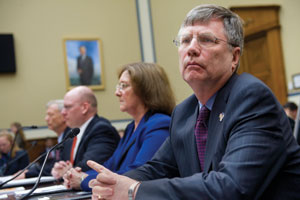CQ WEEKLY – IN FOCUS
Oct. 13, 2012 – 12:29 p.m.
Getting the Diplomatic Security You Pay For
By Jonathan Broder, CQ Staff
Diplomats usually work in obscurity unless they get killed or wounded on the job, or they’re expelled by the host government. Even then, it’s politics that usually grabs the biggest headlines, particularly when an election is looming. Republicans faithfully followed that script last week as they staged a rare recess hearing to flay the Obama administration over what they said was its negligent diplomatic security policies leading to the deaths of the U.S. ambassador and three other Americans in Libya.

|
||
|
Much of the sparring centered around funding for diplomatic security, which at $2.1 billion in fiscal 2012 has to be stretched to secure America’s more than 275 diplomatic posts overseas, including those in near-combat zones. Pushed by House Republicans, Congress voted to cut the Obama administration’s request for diplomatic security funding in fiscal 2011 and 2012, a fact that became an attack line for Vice President
The consulate assault could end up pushing lawmakers to boost security funding, but veteran diplomats say that if history is any guide, any increase is likely to be fleeting. The attack could also spark a broader debate on whether U.S. interests would be better served with a lower diplomatic profile abroad and investment in technologies to protect diplomats when they go outside their embassies.
Either way, amid the finger-pointing on Capitol Hill, what emerged — once again — is that fact that diplomacy is a dangerous profession that requires constant calculations of the risks and costs involved when working in places where governments are weak, anti-American passions run high and guns are plentiful. “We come up with a mitigation strategy to reduce the level of risk,” Undersecretary of State for Management Patrick F. Kennedy told reporters last week. “But we’re never going to end that risk. If we were to end risk, we would close 275-odd missions and withdraw to the United States.”
More Funds — For a While
At the hearing, Maryland’s
“If you look back, you’ll see that’s been the case,” says Susan Johnson, a veteran Foreign Service officer now serving as president of the American Foreign Service Association, which advocates for diplomats. For example, she notes, after the 1979 mob attack on the U.S. Embassy in Islamabad, the 1983 bombing of the U.S. Embassy in Beirut and the 1998 embassy bombings in Nairobi and Dar es Salaam, Congress pumped up the State Department’s diplomatic funding.
“But time passes, memories fade and then the funding goes down again,” she adds, “until the next time.”
Against the backdrop of partisan sparring over the Benghazi attack, a review of appropriations bills shows that the past few years have not been kind to diplomatic security budgets. House Republicans led the charge for hefty cuts as part of their drive to reduce non-defense spending. Although Senate Democrats restored some funds in conference, they too voted for final bills in which funding levels fell far below the administration’s requests.
For fiscal 2011, for example, the House cut nearly $300 million from the administration’s $2.4 billion request for the Worldwide Security Protection account, which funds security personnel for the State Department overseas, and Worldwide Security Upgrades, the account that covers infrastructure improvements to better secure facilities. After conference, the final figure was around $2.3 billion, more than $100 million below the request.
In fiscal 2012, House GOP appropriators proposed cutting more than $700 million from those accounts. That bill never passed the House, but it put down a marker for the House position when they conferenced with Democrats to draft a consensus budget. The omnibus bill that passed that year — with the support of Democrats in the House and Senate — lopped $500 million from the diplomatic-security accounts.
Getting the Diplomatic Security You Pay For
The State Department has requested just over $2 billion for diplomatic security for fiscal 2013. Senate Democrats proposed about $100 million less than that, House Republicans $200 million less. Both chambers met the State Department’s request for security upgrades. Operating under a stopgap spending bill, Congress is not expected to pass a funding bill until December, at the earliest.
Setting Standards

|
||
|
Both diplomats and former congressional officials say the State Department has been following diplomatic security protocols laid down in a 1985 report by retired Adm. Bobby Ray Inman in the wake of the bombings of the U.S. embassy and the U.S. Marine barracks in Beirut two years earlier. The report recommended a range of security improvements for U.S. missions abroad, including increased distances from public streets, a major building program to bolster security at existing embassies and the construction of new diplomatic missions if existing structures couldn’t meet the new security standards. Republicans noted at the House hearing that the facilities in Benghazi did not meet the so-called Inman standards for security.
“We have a strategic plan,” Kennedy testified last week. “We know which embassies are more in danger than others. We are working through that, but there are limitations on funds. I can only construct so many new facilities each year, depending on the funds I have available to me.”
Scott Lilly, a former Democratic staff director of the House Appropriations Committee, notes that the State Department had to spend significant money last year on constructing or retrofitting of U.S. missions in Jakarta, the Pakistani city of Peshawar, the Uzbek capital of Tashkent and Chad’s capital, N’Djamena, all of which have suffered attacks in recent years.
“Who has the crystal ball to know that the next attack is going to Benghazi and not Peshawar or Chad?” Lilly says.
Lilly notes that at last week’s hearing on the Benghazi attack, Issa stressed that he was dedicated to learning about the security challenges that U.S. missions face in the Muslim world today. “If that’s your position, how do you justify these major cutbacks?” Lilly asks. “Congress ought to be advocating for more resources so we don’t face these situations. Instead, they’re cutting the crap out of the administration’s requests year after year after year.”
But Republicans reject such accusations. In addition to pointing out that Democratic votes helped pass the recent diplomatic security budgets, they argue that the challenge for the State Department is not one of money, but of setting priorities. “We have more than 6,000 contractors, a private army there . . . in Baghdad,” Utah Republican Rep.
Some current and former State Department diplomats agree with Chaffetz’s point. Johnson, who has spent more than 30 years as a Foreign Service officer, complains that such outsize and fortress-like diplomatic missions as the one in Baghdad end up undercutting U.S. diplomatic goals. “The more security you invest in, the more you’re hobbling your own ability to get out and about in the country and conduct personal diplomacy,” she says.
She and others suggest that a smaller U.S. diplomatic footprint overseas — with fewer people but all with expertise in the language, politics, key actors, history and culture of their host countries — would be more effective diplomatically. “Right now, we’re going for quantity,” says Johnson, adding that the ratio of security and support personnel to diplomats can run as high as 15-to-1. “It’s depressing.”
Johnson says the State Department should move away from what she calls the Inman report’s one-size-fits-all security standard for U.S. missions abroad.
“The cookie-cutter approach costs a lot of money, and it often handicaps diplomats when they don’t need to be,” Johnson says. One consequence has been the construction of new embassies outside of cities, which makes it more difficult for people to visit and harder for diplomats to get out and mix with the population. When she was deputy chief of mission in Bosnia from 2004 to 2006, long after the Balkan war had ended, Johnson says she had more diplomatic security than at her previous posting in Baghdad, when the war there was still raging. “In Bosnia, I had nine bodyguards, a fully armored SUV and a follow car,” she recalls. “I couldn’t go anywhere without these people.”
Getting the Diplomatic Security You Pay For
Foreign Service officers accept that danger is part of their job. Even in places like the heavily fortified embassy in Baghdad, there is danger. Former Ambassador Richard Roth, who served as political adviser to the Central Command during the Iraq War, says the embassy, built on the banks of the Tigris River at a cost of $750 million, remains an easy target for anyone standing on the opposite bank with a rocket-propelled grenade. “It’s an easy shot,” he says, “if someone wants to take it.”
Emily Cadei contributed to this story.
FOR FURTHER READING:
Fiscal 2013 State-Foreign Operations appropriations (